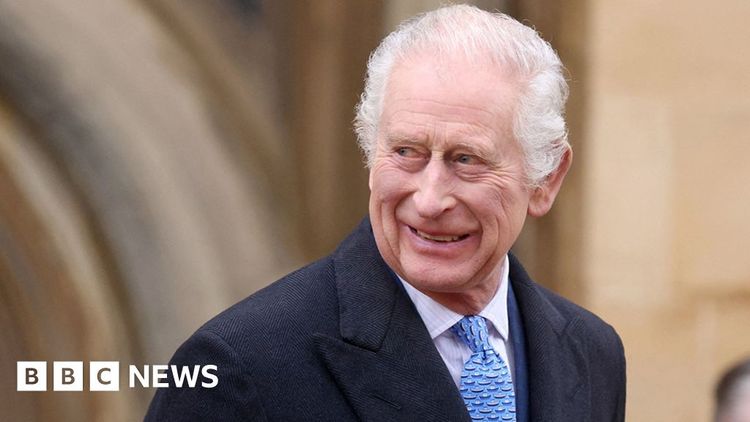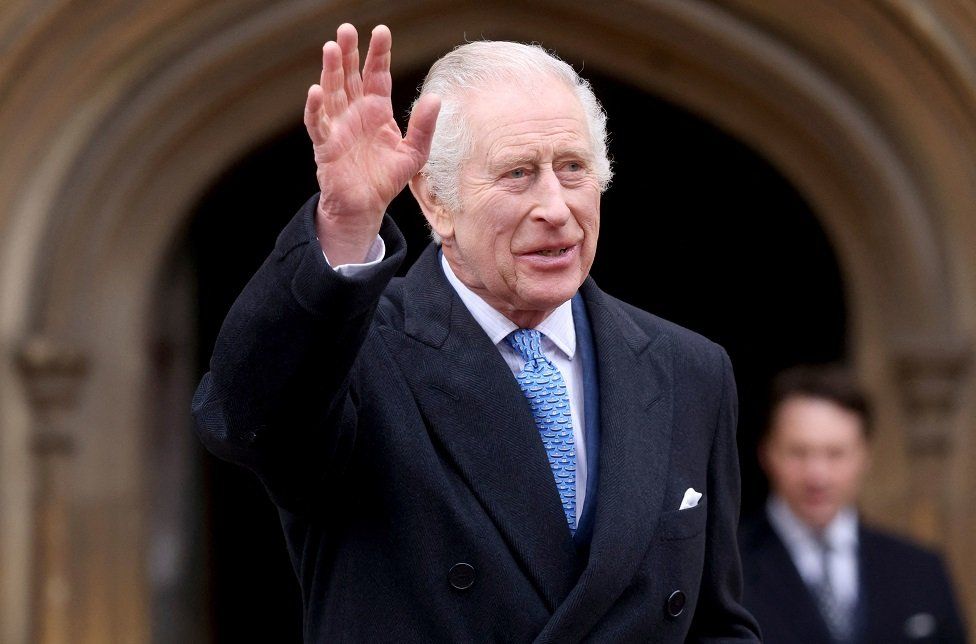King Charles: How is his cancer treatment going three months after diagnosis?

The section of the blog is to be rephrased in freely written English by employing alternative vocabulary: Picture credit, PA Media

The monarch welcomed supporters during a religious ceremony on March 31st that commemorates Easter.
Nearly three months have passed since King Charles received news of having a particular cancer type without any specific details provided.
During that period, the king, aged 75, expressed his complete optimism regarding his medical care and anticipated his prompt resumption of public engagements.
Despite delaying his appearances in front of the public, he carried out his responsibilities as the leader of the country by completing official documents and holding confidential discussions.
He feels highly motivated to restart some of his public obligations despite receiving ongoing medical treatment for cancer.
King's Current Condition?
The vibe of Buckingham Palace is encouraging.
The King's health team is feeling positive about his ongoing recuperation and his physicians have expressed satisfaction with the progress he has made thus far.
If necessary, His Majesty's engagements will be adjusted to lessen any potential harm to his ongoing recovery.
An instance of this could be that he won't commit to attending an entire summer program.
The monarch, for the most part, has lived a healthy and energetic lifestyle, with minimal documented health issues.
His cancer was found accidentally while he was undergoing a procedure for a non-cancerous enlargement of his prostate.
As soon as the cancer was detected, he promptly began a regimen of therapy.
Professionals are aware that detecting and addressing cancer in its early stages increases the likelihood of a successful healing process.
Is He Still Undergoing Treatment?
The Palace has informed that the "treatment plan" of the individual will persist, and they cannot determine its duration at the moment.
No specific information has been disclosed regarding the nature of the medical care that the monarch is receiving.
There are numerous types of therapies available to treat cancer.
Certain treatments demand frequent hospital visits and cause more adverse effects than others, while there are other options that can be administered at the patient's residence.
Cancer can be faced in various ways such as the surgical process, chemotherapy, and radiotherapy. These methods aim to eliminate or eradicate the cancerous cells.
Frequently, a fusion of various methods is utilized.
It is crucial to also prioritize post-treatment care, which may involve undergoing scans and attending regular checkups.
There are individuals who might undergo cancer therapy for a prolonged period, which can last for weeks, months, or even years.
There are various reasons why one may seek preventive measures against cancer recurrence, induce cancer remission, or manage cancer progression.
Certain courses of treatment may temporarily weaken the body's immune system, resulting in an elevated susceptibility to infections.
"Is The King Overextending Himself?"
The diary of the King will be adjusted with caution by Buckingham Palace while he recuperates, as per their statement.
The medical personnel in charge of him will work closely together to guarantee that he receives all the medical attention he requires. They do not want any of his responsibilities to impede his recovery, and they will adjust his engagements if it becomes necessary.
Suffering from cancer and receiving treatments to cure it can result in the feeling of severe exhaustion or weariness. This sensation may fluctuate at various times during the day, and every day can feel distinct.
What Cancer Does The King Have?
The details of the King's cancer have not been revealed by the palace; however, it has been stated that it is not prostate cancer.
As with any individual seeking medical treatment, personal medical information is confidential.
According to Buckingham Palace's statement, the King is pleased to be returning to his public engagements and is thankful for his medical team's ongoing care and expertise.
Living With Cancer: A Personal Account
The ruler now belongs to the countless individuals globally who are coping with cancer. In the United Kingdom, half of the population gets diagnosed with one form of cancer at some point in their lives.
Being diagnosed with this condition affects not only your physical well-being but also your relationships with others, both personal and professional.
Following a brief break, the King will soon resume his public responsibilities.
It's worth mentioning that he will be heading to a medical institution specialized in cancer treatment as the first stop on his itinerary next week.
He now has a personal understanding of the experience of living with cancer, but the path is unique for each person who is impacted.
Although his tale may differ from the norm, he expresses profound appreciation for the generosity and well-wishes he has received since disclosing it to the public.
For those who are juggling the demands of cancer treatment alongside their daily responsibilities, such as managing finances, there are useful resources and guidance available to provide practical assistance and information.
Getting emotional support is extremely important as well. You can confide in someone you have a good relationship with, like a close friend or significant other. Alternatively, you could speak with a medical professional such as your doctor or a specialized nurse. Other groups like Mind and MacMillan also provide this type of support.









































